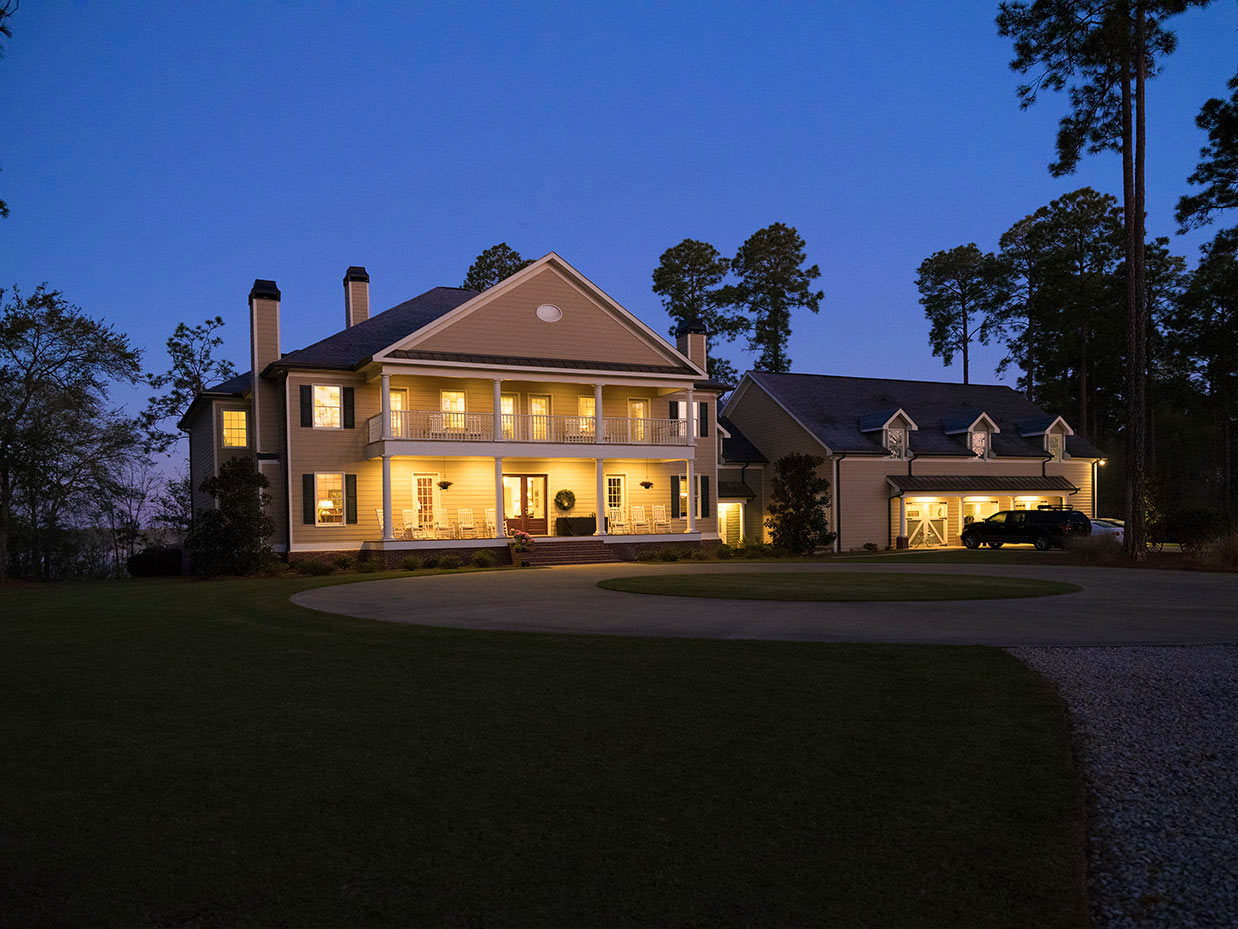
It’s a song of the South. Music to the ears of those who yearn for bygone days when the world moved at a slower pace and days afield were meant to be savored. It’s a tune played out in the jangling chains of the mule-drawn wagon, the creaking of saddle leather, the sing-songy voice of the wagon driver talking to the team—all punctuated by whirring wings and the percussion of gunfire. Such is the soundtrack of quail hunting at South Georgia’s Pine Hill Plantation, where guests get to experience what it would be like to hunt on their own private plantation.
Horses, mules and wagons have been part of the fabric of Southern quail hunting for more than 200 years. Back in the day, farmers would hitch their mules to a wagon, load up dogs and a lunch, and ride along on horseback so that they could move quickly from wild covey to wild covey. In the late 1800s and early 1900s wealthy Northern industrialists began buying winter retreats in southern Georgia and northern Florida—and they fell in love with quail hunting. Many of these individuals also had shot birds in England, and they decided to introduce the gentrified nature of estate shooting to Southern quail hunting. They did this by building grand plantation homes, commissioning purpose-built quail wagons, employing thoroughbred horses, and taking afield fine side-by-side shotguns. They also had their private chefs and staffs prepare meals and cater to guests.


As time progressed, such rarefied hunting became even more exclusive, to the point that today it is enjoyed on only a scant number of private plantations. And as you would imagine: by invitation only.
Pine Hill Plantation owner Doug Coe has been lucky enough to enjoy such exceptional hunting, and he wanted to make the experience accessible. “Early in my business career I had the opportunity to hunt a number of the private plantations here in South Georgia,” Coe said. “What I found is that hunting by horse and wagon can transport you to a time gone by. The pace of the world slows down—and that’s something that’s hard to find these days. Today that experience is only available on privately owned plantations, and you have to have an invitation. So our mission is to offer an experience that feels like you’re at a private plantation even if you don’t have the invitation.”

Of course, providing such an experience is costly. Take the wagon hunting alone. A hunt party for four guests typically requires four horses, two mules, a wagon, 10 to 12 pointing dogs, a flushing-and-retrieving dog, a wagon driver, a huntmaster and a dog handler. And because the group is constantly on the move, more habitat is required—habitat that has to be managed properly year-round to provide the authentic covey-rise shooting that private plantations are known for.
According to Coe, “The historical reason for going by horse and wagon was that you began at the estate house and might go a mile or two to the back reaches of the estate to hunt. And then with hunting wild birds, it’s not like the put-and-take places where you hunt 40 acres in a day and you go 50 yards and find where they’ve put four or five birds, and then another 50 yards and you find two more. Here you go pretty good distances from covey to covey. We’ll cover 250 to 300 acres in a day. And so the horseback and mule-drawn wagon are very practical in that they convey you quickly from covey find to covey find.
“And when you’re working the dogs, the dogs are ranging and casting off the huntmaster’s horse. So what the huntmaster does is that he zigs and zags through the woods, which encourages the pointing dogs to range and cast through the woods, to cover ground effectively and find scent—which leads to finding birds. If you drove a mechanical conveyance through the woods like that, you’d absolutely beat up the cover and it would be destructive to the habitat. Whereas the horse is perfect. So even today it’s very practical, but it’s rooted in history and tradition.”

As to managing Pine Hill’s more than 6,000 acres of classic longleaf pine timber with wiregrass understory, Coe said, “What we’re doing is that we’re hunting, and we have wild birds. We feed the wild birds. We manage the habitat to have sufficient cover for them to propagate, and then we supplement them in late summer/early fall with a very expensive bird that is one generation off wild, so that it’s got the genetics to survive . . . . By the time we get out during hunting season, certainly not all the birds have survived; but the ones that have have mixed with wild coveys and it’s hard to tell one from the other. The result is covey-rise shooting. And there’s nothing more thrilling than getting up a covey of 15, 20, maybe 30 or even 40 birds and they all leave at once. You lose your wits; your stomach’s up in your throat. I see first-time guests who see that and say, ‘Wow!’ and they don’t even shoulder the gun.”


In addition to the wagon hunting and well-managed habitat, the other aspect of Pine Hill that gives guests the private-plantation feel is the accommodations. “Each of the guest groups has a private lodge,” Coe said, “and along with that comes a chef and hospitality assistants who are there just to serve their group. So it’s like being at your own place. That means dinners in your private dining room right there in your lodge, which is pretty special. Lodges are situated so that we may have all four occupied, but rarely will you see or recognize that there is another guest group. Similarly in the field, it will be rare that you hear the gunshot of another group. And that’s the way it works on private plantations.”
Exclusivity, hunting from wagons in classic habitat, and luxurious accommodations and service. These are things that guests at Pine Hill Plantation enjoy—and what keep them coming back for an authentic quail hunting experience.
Pine Hill Plantation is a full-service Shooting Sportsman Endorsed Lodge. For more information on Pine Hill Plantation, call 229-758-2464 or email cameronsumlar@pinehillplantation.com.
Read our Newsletter
Stay connected to the best of wingshooting & fine guns with additional free content, special offers and promotions.




